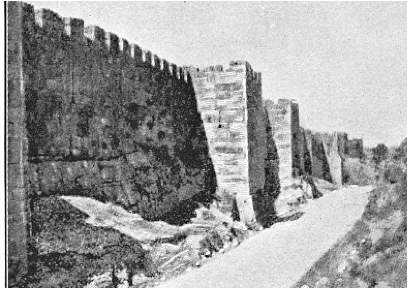
It was a big project – a wall. Not Donald Trump’s 2016 wall, but Nehemiah’s 446 B.C. wall. When a big project is in front of a family, a business, a church or a mission organization, it needs out-of-character participation to succeed.
Nehemiah 3 is a telephone directory of 42 different individuals or groups who participated in building the wall. We know nothing about most of them. But there are a few clues about some special participants.
Building a wall sounds like a job for tradesmen. Outdoorsmen. Men who are brawny. Men accustomed to working around power tools (in our day) or hammers and chisels (Nehemiah’s day). Calloused hands. Big biceps. Thunder thighs. Tough guys.
Glance down the text. Verse 1 tells us some priests – some men of the cloth – equivalent to today’s pastors – worked on building the sheep gate. Good for the guys who work only one hour a week – they rolled up their sleeves and did an honest day’s work. 1
What’s this in verse 5? “The men of Tekoa repaired a section . . . .” Good for them. “ . . . but their nobles would not put their shoulder to the work . . . .” Lazy no-goods. In every effort – business, church or family — many will participate, but others will “stop at nothing ” (meaning either a given person does one thing after another continually, or do nothing).
Verse 8 has “out-of-character participants.” Goldsmiths worked one section. When you think of goldsmiths, what pops onto the screen of your mind? Tattooed, muscle-bound Harley bikers? No. I think of trim, slight, light-weight men who are artistic, refined, well-read and cerebral. Goldsmiths normally work in delicate, fine filigree. Yet these guys step out-of-character and work outdoors on the wall. Goldsmiths also appear in verse 31 and 32.
Our second out-of-character participants are seen in verse 12: “. . . with the help of his daughters.” Some of the women folk escaped the kitchen, rolled up their sleeves and mixed it up with Dad working the wall. We do not normally think of wall-building as woman’s work. But these participants were willing to do whatever they could.
Verses 19-21 report an encouraging thing. Three times we read that someone repaired “another” section. Grand volunteers take on “another” part of a given project. Every successful effort, evangelistic campaign, building project, business plan or family undertaking needs-plus people.
The last out-of-character group appears in verse 8. Perfume-makers. My image of those who make perfume is a stylish, aesthetically-oriented, well-dressed, cosmopolitan person (likely French) who would be much more comfortable in a hair salon than muscling heavy granite tools on a construction site.
Employers are looking for those who are willing to be trained to be out-of-character workers. Parents hope their sons and daughters will step out-of-character toward maturity. Pastors hope people will grow to step into out-of-character spiritual opportunities.
Blessed are those who can step out of their normal occupational genre to assist in achieving grand accomplishments.
- This characterization is false. I averaged 65-hours a week as a pastor for 45 years. Pastoring is consuming, But I include it here to ring smile and give a nod to this popular perception.


Recent Comments